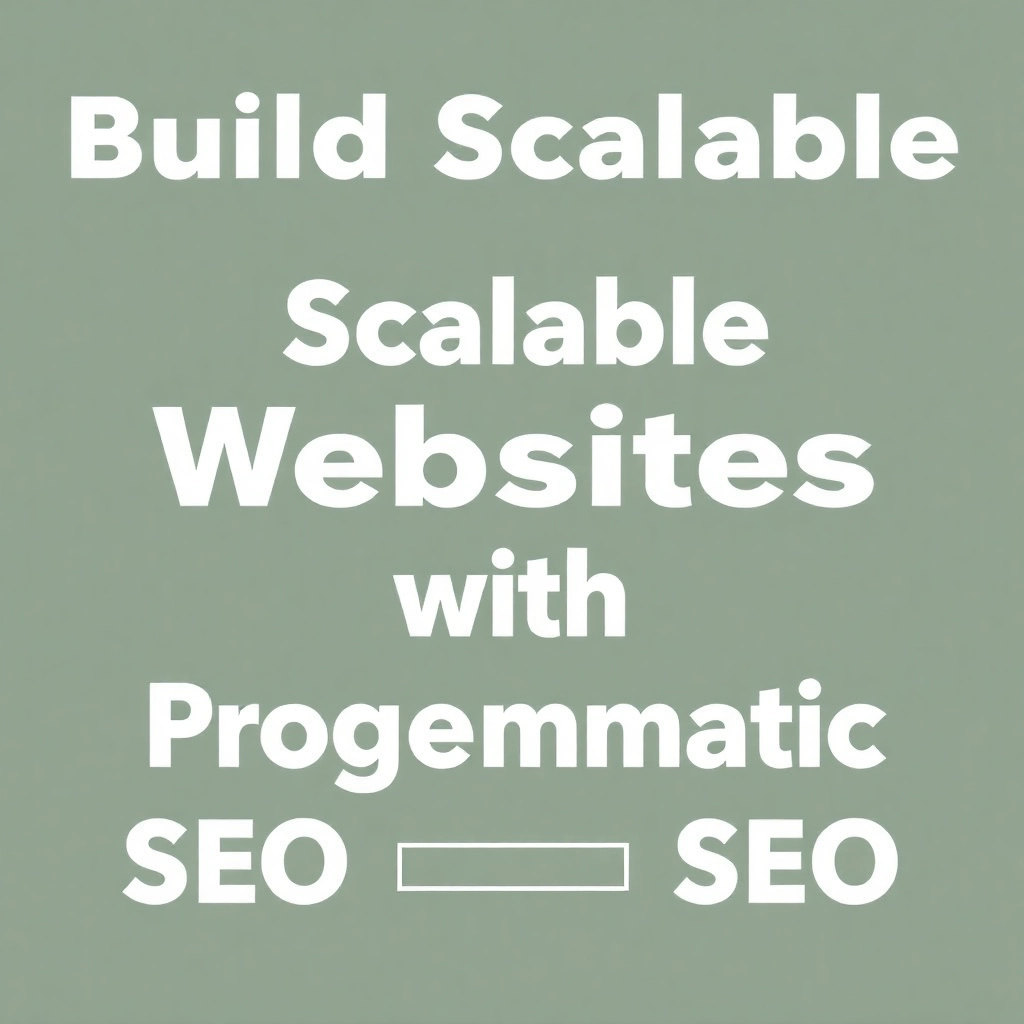Introduction
Imagine you’re a marketing agency owner tasked with handling multiple client projects simultaneously. Each client requires a unique website designed to attract traffic, convert leads, and ultimately drive revenue. Now, consider how daunting this task can become as you try to keep pace with demand while maintaining quality. You might find yourself wishing for a magic wand to create scalable solutions. Enter Programmatic SEO, your new best friend in the digital marketing space.
Understanding Programmatic SEO
To truly grasp how to build scalable websites with Programmatic SEO, let’s first clarify what it is. Programmatic SEO involves utilizing data-driven techniques and automation to generate a substantial volume of web pages. Instead of manually crafting every page, marketers leverage scripts, templates, and data feeds to streamline the entire process. Think of it as creating a recipe where you can cook many variations of the same dish without having to start from scratch each time.
For instance, take Zillow, the real-estate search engine. They effectively use Programmatic SEO to automatically generate thousands of property listing pages, each tailored to specific search queries. This not only ensures that they provide relevant content but also keeps them competitive in the real estate market by appearing in front of prospective buyers. By understanding your audience’s search behavior, you can automate the creation of content that meets their needs, thereby building scalable websites with Programmatic SEO.
Key Strategies for Implementation
Now that we’ve established what Programmatic SEO is, the logical progression is to delve into effective strategies for implementation. Below are a few methodologies that can enhance your execution.
1. Utilize Templates for Consistency
Creating templates for your web pages can significantly reduce the workload. These templates can incorporate dynamic fields that pull data from your databases. For example, with an e-commerce website, you might design a product page template and let the data from your inventory management system fill in the details for each product automatically. This ensures consistent formatting and branding while allowing you to scale effortlessly.
2. Leverage Structured Data
Integrating structured data into your site helps search engines better understand your content, thus improving your SEO rankings. By implementing schema markup, you enhance visibility across SERPs, potentially leading to increased click-through rates. This is critical when deciding to build scalable websites with Programmatic SEO, as it essentially allows you to communicate effectively with search engines.
3. Automate Keyword Research
One of the most tedious tasks in SEO is keyword research. To automate this process, consider using tools like Ahrefs or SEMrush, which can offer insights into high-potential keywords. By feeding these keywords into your content automation scripts, you can create pages optimized not just for generic terms but for long-tail variations that often yield higher conversions.
Real-World Example: How a Marketing Agency Implemented Programmatic SEO
Let’s take a look at a case study from a successful marketing agency that adopted Programmatic SEO. Agency XYZ had been struggling with client deliverables, juggling several projects at once. They began by creating a dynamic content generation strategy that included templates for various niches: law firms, restaurants, and e-commerce.
Using these templates, they were able to produce hundreds of unique landing pages optimized for local SEO in a matter of weeks. Initially, overnight success was expected, but through consistent iteration and data analysis, client website traffic saw a 300% increase within just three months. The agency had effectively learned how to build scalable websites with Programmatic SEO—allowing them to serve numerous clients without the growing pains of traditional web development.
Future Trends in Programmatic SEO
As technology evolves, so does the landscape of digital marketing. Future trends suggest increasing reliance on AI-driven content generation and voice search optimization. With the rise of voice search, implementing programmatic strategies that accommodate voice queries will be crucial. Agencies that pivot to these emerging trends will maintain a competitive edge, ensuring they can continue to build scalable websites with Programmatic SEO.
Conclusion
Programmatic SEO presents a powerful opportunity for marketing agencies looking to scale their web development efforts. By automating repetitive tasks, utilizing templates, and analyzing data, agencies can produce tailored content efficiently. Embracing this innovative approach will not only enhance agency productivity but also provide clients with the competitive advantage they need to thrive in a saturated digital landscape.
FAQs
What is Programmatic SEO?
Programmatic SEO is a technique that automates the creation of web pages, leveraging data-driven strategies to enhance efficiency and scalability.
How can I implement Programmatic SEO for my clients?
Start by creating templates for web pages, integrating structured data, and using automated keyword research tools to inform your content development.
Is Programmatic SEO suitable for all types of websites?
While it can be beneficial for many types of websites, particularly those needing numerous similar pages (like e-commerce or real estate), it’s essential to evaluate your specific goals and audience.
What tools are recommended for Programmatic SEO?
Tools like Ahrefs, SEMrush, and Google Data Studio can assist with keyword research, data organization, and performance tracking in a Programmatic SEO strategy.
Can Programmatic SEO improve my website’s search rankings?
Yes, by optimizing your large volume of web pages with high-potential keywords and structured data, you can improve your site’s search engine rankings and visibility.
